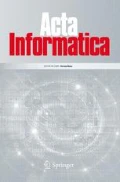Summary
In this paper we propose a notion of fairness for transition systems and a logic for proving properties under the fairness assumption corresponding to this notion.
We start from an informal characterization of the unfairness as the situation where some event becomes possible infinitely often but has only a finite number of occurrences, which induces various definitions of fairness by considering different classes of events. It results from the comparison of these definitions that the concept of fairness which is useful is “fair reachability” of a given set of states P in a system, i.e. reachability of states of P when considering only the computations such that if, during their execution, reaching states of P is possible infinitely often, then states of P are visited infinitely often.
This definition of fairness suggests the introduction of a branching time logic FCL, the temporal operators of which express, for a given set of states P, the modalities “it is possible that P” and “it is inevitable that P” by considering fair reachability of P. The main result is that, given a transition system S and a formula f of FCL expressing some property of S under the assumption of fairness, there exists a formula f′ belonging to a branching time logic CL such that: f is valid for S in FCL iff f′ is valid for S in CL. This result shows that proving a property under the assumption of fairness is equivalent to proving some other property without this assumption and that the study of FCL can be made via the “unfair” logic CL, easier to study and for which several results already exist.
Finally, the proposed notion of fairness is compared to other related notions such as the absence of livelock, the absence of starvation and the finite delay property.
Similar content being viewed by others
References
Abrahamson, K.: Modal logic of concurrent non deterministic programs. Semantics of concurrent computation, Lecture Notes in Computer Science 70, pp. 21–33. Berlin, Heidelberg, New York: Springer, 1979
Apt, K.R., Pnueli, A., Stavi, J.: Fair termination revisited — With delay. In: Proc. 2nd Conference on FST and TCS, Bangalore, India, (to appear) 1982
Ben-Ari, M., Manna, Z., Pnueli, A.: The temporal logic of branching time. 8th Annual ACM Symp. on Principles of Programming Languages, pp. 164–176, 1981
Clarke, E.M., Emerson, E.A.: Design and synthesis of synchronization skeletons using branching time temporal logic. In: Logics of Programs LNCS 131, 52–71 (1981)
Dijkstra, E.W.: Solution of a problem in concurrent programming control. Comm. ACM 8, 9, 569 (1965)
Dijkstra, E.W.: Hierarchical ordering of sequential processes. Acta Informat. 1, 2 (1971)
Emerson, E.A., Clarke, E.M.: Characterizing correctness properties of parallel programs using fixpoints. Proc. ICALP 80, Lecture Notes in Comput. Sci. 85, pp. 169–181. Berlin, Heidelberg, New York: Springer, 1980
Flon, L., Susuki, N.: Non determinism and the correctness of parallel programs. In: Neuhold, EJ. (ed.). Formal description of programming concepts, North-Holland 1978, pp. 589–608
Grumberg, O., Francez, N., Makowsky, J.A., de Roever, W.P.: A proof rule for fair termination of guarded commands. Technical Report RUU-CS-81-2 Univ. of Utrecht, Dept. of Comput. Sci., 1981
Gabbay, D., Pnueli, A., Shelah, S., Stavi, J.: On the temporal analysis of fairness. Proc. 7th Annual ACM Symp. on Principles of Programming Languages, pp. 163–173, 1980
Karp, R.M., Miller, R.E.: Parallel Program Schemata, J. Comput. Syst. Sci. 3, 147–195 (1969)
Kwong, Y.S.: On the absence of livelocks in parallel programs. Semantics of Concurrent Computation, Lectures Notes in Comput. Sci. 70, pp. 172–190. Berlin, Heidelberg, New York: Springer, 1979
Lamport, L.: “Sometime” is sometimes “not never” — on the temporal logic of programs. Proc. 7th Annual ACM Symp. on Principles of programming Languages, Las Vegas, pp. 174–185, 1980
Lehmann, D., Pnueli, A., Stavi, J.: Impartiality, justice and fairness: the ethics of concurrent termination. ICALP, LNCS 115, 264–277 (1981)
Park, D.: On the semantics of fair parallelism Abstract Software Specifications. Lecture Notes in Comput. Sci. 86, pp. 504–524. Berlin, Heidelberg, New York: Springer, 1980
Park, D.: A predicate transformer for weak fair iteration. Proc. of the Sixth IBM Symp. Math. Foundations of Comp. Sci., 1981
Plotkin, G.D.: A powerdomain for countable non-determinism. In: Proc. ICALP 82, LNCS 140, 418–428 (1982)
Queille, J.P., Sifakis, J.: Specification and verification of concurrent systems in CESAR. Internat. Symp. Progr., Lecture Notes on Comput. Sci. 137, pp. 337–351. Berlin, Heidelberg, New York: Springer, 1982
Schwartz, R.L., Melliar-Smith, P.: Temporal logic specification of distributed systems. Proc. 2nd Int. Conf. on Distributed Comput. Syst., pp. 446–454, 1981
Sifakis, J.: Deadlocks and livelocks in transition systems Mathematical foundations of Computer Science. Lecture Notes in Comput Sci. 88, pp. 587–600. Berlin, Heidelberg, New York:Springer, 1980
Sifakis, J.: A unified approach for studying the properties of transition systems. TCS 18, 227–258 (1982)
Author information
Authors and Affiliations
Rights and permissions
About this article
Cite this article
Queille, J.P., Sifakis, J. Fairness and related properties in transition systems — a temporal logic to deal with fairness. Acta Informatica 19, 195–220 (1983). https://doi.org/10.1007/BF00265555
Received:
Issue Date:
DOI: https://doi.org/10.1007/BF00265555



